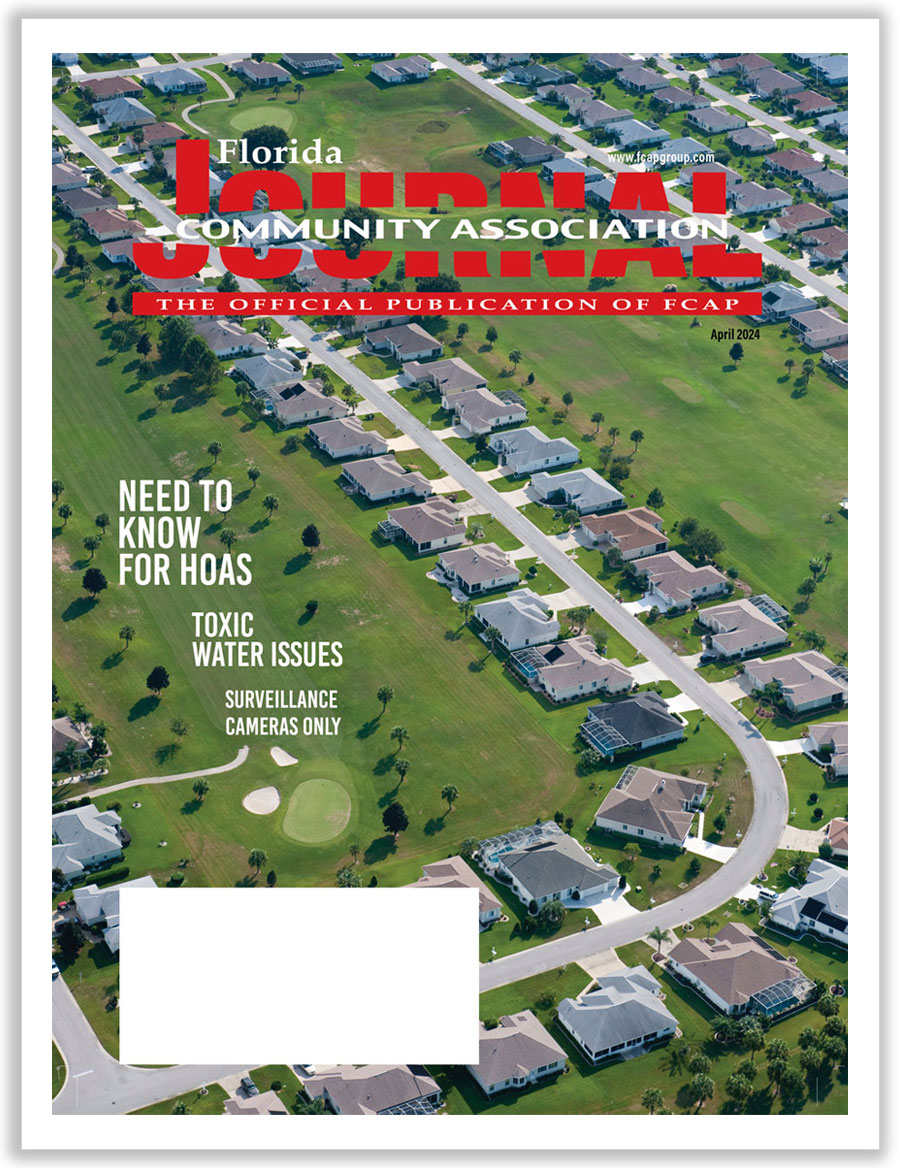
Avoid Problems Even When Someone Is Injured
By Michael J. Gelfand, Esq. / Published June 2019

What to do when you get sued may be asking the question a bit too late. As we seek to assist clients to be “ahead of the game” and avoid some of the pitfalls common to many associations and businesses (remembering that associations are businesses, a special type but still a business!), two recent appellate court decisions serve as lessons to help avoid problems even when someone is injured.
Each of the following summary articles illustrates a different legal doctrine regarding the gathering of information to protect your association, information many would think was confidential. But without advance procedures and advance planning, you may have to disclose information to someone suing your association.
Photos of Incident Scene Must Be Preserved and Produced
It is not unusual for someone to slip and fall or have an incident, causing an injury on association property. Frequently that is followed with a claim against the association and the company managing the area.
With increased frequency, injured persons seek association photographs that were saved to document the scene of the incident. Can the injured party obtain these photographs as evidence to help prove his or her case? Are there penalties for failing to preserve the evidence? The answer may depend upon the reason the photographs were taken.
The first decision discussed this month involved a claim in a Florida community. A Florida appellate court recently ruled that the condominium association’s management company must produce photographs taken near the scene of the accident to the person suing. The facts in FirstService Residential Florida Inc. v. Rodriguez, 43 Fla. L. Weekly D 2709 (Fla. 5th DCA, December 7, 2018), indicate that a condominium unit owner sued the association and its property manager for injuries she sustained after she slipped and fell on a foreign substance while walking to the elevator of her building.
The dispute over the right to the photographs arose when the injured unit owner scheduled a deposition of the property management company’s corporate representative. Before the deposition took place, the management company asserted that the management company’s photographs taken to document the scene of the accident to defend against the anticipated lawsuit should not be available to the person suing. At the deposition, the management company objected to questions regarding the photographs, leading the plaintiff to file a motion to compel the management company to produce the photographs.
The plaintiff argued that she did not have any photographs taken on the day of the fall, and thus she had no way to recreate and prove the scene depicted in the management company’s photos. Further, she claimed that it would create an undue hardship to let the management company keep secret the only known photographs of the scene. The trial court granted the motion to compel and ordered the management company to produce the two photographs.
On appeal, the Florida appellate court reviewed when photographs must be shared with the injured party suing, and in this instance denied the management company’s request to overturn the decision of the trial court, leaving the trial court’s disclosure order standing.
The appellate court explained the doctrine preventing the sharing of evidence known as the “work product privilege.” The work product privilege is found in the Florida Rules of Civil Procedure, specifically Rule 1.280, as follows:
A party may obtain discovery of documents and tangible things otherwise discoverable under subdivision (b)(1) of this rule and prepared in anticipation of litigation or for trial by or for another party … only upon a showing that the party seeking discovery has need of the materials in the preparation of the case and is unable without undue hardship to obtain the substantial equivalent of the materials by other means.
Applying the rule to the injury at the condominium means that a party seeking information such as photographs must show that it needs the information to properly prepare for trial and cannot “without undue hardship” obtain the materials by any other means. Because the management company apparently was not able to factually challenge the hardship need for the evidence, the photographs had to be provided to the injured party.
There are important association lessons from this decision. The first is to have procedures drafted in advance to address what should occur when there is an injury involving property administered by an association. Properly defined procedures may assist in retaining the confidential nature of information.
After taking steps to ensure the health of the injured party, such as calling 911, many associations have procedures to secure the scene, including photographing the area and completing an incident report. Written policies help reinforce the procedure to secure the scene, especially as the situation may be chaotic. The policies should properly specify the purpose of the documentation to trigger the right to assert the work product privilege, and retention timing to help avoid spoliation [failure to preserve evidence] and other sanctions.
Adverse Medical Statements By Employees May Be Protected By Attorney Client Privilege
In another case addressing the ability to access what was asserted to be confidential information, a Florida appellate court explained another doctrine, the “attorney-client privilege,” which is found in the Florida Evidence Code and Florida Constitution. The attorney-client privilege is a counterpart to the “work product” doctrine discussed above. In The Nemours Foundation v. Arroyo, 43 Fla. L. Weekly D 2767 (Fla. 5th DCA, December 14, 2018), the parents of a child sued a hospital for damages the child sustained during a medical procedure that was allegedly performed negligently.
The parents sought production of all adverse medical incident records from the hospital. The hospital claimed that the documents were protected by the attorney-client privilege. The trial court ordered the hospital to produce written statements provided by five employees to its in-house counsel, finding that the attorney-client privilege did not apply to these documents because they were discoverable “fact work product” obtained as part of the investigation of the incident.
In determining which law applies, the appellate court reviewed the application of Florida’s attorney-client privilege. This privilege applies to keep confidential communications between employees of a corporate client and in-house counsel. Generally, there is a five-part test to protect confidentiality in this context, which the appellate court summarized:
- the communication would not have been made but for the contemplation of legal services;
- the employee making the communication did so at the direction of his or her corporate superior;
- the superior made the request of the employee as part of the corporation’s effort to secure legal advice or services;
- the content of the communication relates to the legal services being rendered, and the subject matter of the communication is within the scope of the employee’s duties;
- the communication is not disseminated beyond those persons who, because of the corporate structure, need to know its contents.
Normally, an association has to prove these five elements if an association seeks to rely on this test to preserve the confidentiality in face of a court challenge.
Thus, reviewing the five-part test, you can see that to protect your documents, photographs, or other evidence under the attorney-client privilege or as work product, it is very important to follow your attorney’s instructions, including how to label information, especially if the information is attorney-client privilege or created in contemplation of litigation. Otherwise, the association may risk losing confidentiality and being forced to turn over materials you created to help your defense to the other side.
Conclusions
Some may ask, does not an owner/member of an association have a right to information, including photographs and other items, automatically as an association official record? Assuming that information such as a photograph or attorney letter is an official record otherwise accessible, the Condominium Act, the Homeowners Association Act, and the Cooperative Act each have certain exceptions for the “work product” material and the attorney-client privilege information defined in the appellate court decision.
Nevertheless, associations should take care to preserve records documenting injuries and events pursuant to their records retention policies. Destruction or “losing” a record so that it is not available for trial can not only appear strange but may trigger court “spoliation” sanctions preventing an association from defending against a claim.
If an association receives a demand to preserve information, that request should be carefully evaluated. It is never too early to review the association’s contracts for liability shifting. Also, confer with the association’s insurance agent to confirm the extent of policy coverages and exceptions.
Bottom line, the unexpected happens, but procedures properly drafted in advance can assist!
Michael J. Gelfand, Esq.
Senior Partner of Gelfand & Arpe, P.A.
Michael J. Gelfand, Esq., the Senior Partner of Gelfand & Arpe, P.A., emphasizes a community association law practice, counseling associations and owners how to set legitimate goals and effectively achieve those goals. Gelfand is a dual Florida Bar Board-Certified lawyer in Condominium and Planned Development Law and in Real Estate Law, Certified Circuit and County Civil Court Mediator, Homeowners Association Mediator, an Arbitrator, and Parliamentarian. He is a past Chair of the Real Property Division of the Florida Bar’s Real Property, Probate & Trust Law Section, and a Fellow of the American College of Real Estate Lawyers. Contact him at ga@gelfandarpe.com or (561) 655-6224.




